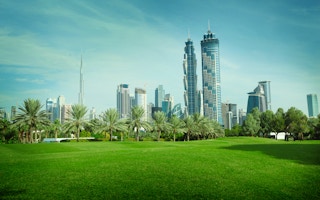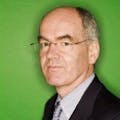It was hot, it was Earth Day 2015, and I was poised to walk onstage at the Dubai World Trade Center.
To continue reading, subscribe to Eco‑Business.
There's something for everyone. We offer a range of subscription plans.
- Access our stories and receive our Insights Weekly newsletter with the free EB Member plan.
- Unlock unlimited access to our content and archive with EB Circle.
- Publish your content with EB Premium.
The occasion: the second World Green Economy Summit. In the spirit of transparency, I was happy because I was about to do a ‘Green Visionaries’ session with a real hero, solar adventurer Raphael Domjan. Among other things, he has sailed around the world in his PlanetSolar catamaran, powered by 38,000 photovoltaic cells. Next, for him at least, a trip the edge of space in a solar plane.
Then my phone pinged. I saw an email from Hazel Henderson. Given the summit’s theme, I pulled up her note on the Green Transition Scoreboard. By Earth Day, she said, a total of $6.22 trillion had been invested in the global green economy since 2007.
That’s a huge number—and, when I dropped it into my presentation, it helped bring our green visions down to earth, placing them in a broader market context. Interestingly, Hazel also noted that the Scoreboard, which projects $10 trillion of private investments in the green economy by 2020, is on track to reach that goal.
More details can found in Breakdowns Driving Breakthroughs, which introduces a new sector to the Scoreboard, ‘Life Systems.’ This focuses on system-wide interconnections among efficiency, information and digitization, energy, water, food, education and health, accounting for 14% of the value of the Green Transition Scoreboard.
No doubt conferences and summits will help boost Dubai’s position on the Scoreboard over time. But the emirate has ambitions above and beyond having the world’s tallest skyscraper, the 830-meter Burj Khalifa, and running major Green Economy events. Its publicly stated goal is to be recognized as the “Capital of the Green Economy” by 2021.
As I said at the end of my presentation that day, this would be no small feat. Indeed, I wondered aloud whether it would even be possible? There is no doubting the serious intent underlying the words. Among Dubai’s immediate priorities are developing a regulatory framework to incentivize green infrastructure investments, ensuring diversification of energy sources, and evolving a carbon abatement strategy in alignment with the objectives of its Integrated Energy Strategy for 2030.
“
All great, but my point was that any self-respecting world capital of the green economy, particularly one with its tap-root suckling on oil, would need to meet a number of other criteria.
All good, but this is a patriarchal society, for all it talks about engaging young people. A cultural shift is needed. And Dubai’s economy is basically built on fossil fuels. According to sometimes reliable Wikipedia, it is sitting on 4 billion barrels of the stuff, out of a total for the United Arab Emirates of almost 100 billion barrels—on a par with Kuwait’s reserves. Again, fine, but if strict climate controls were ever to be imposed, Dubai could become the ultimate stranded asset. No wonder the city’s government is beginning to invest heavily in major solar farms.
Earlier this year, DEWA (the Dubai Electricity & Water Authority) launched a tender for a 100 MW solar plant as part of the second phase of the Mohammed bin Rashid Al Maktoum solar park. The 40-square-kilometer park south of Dubai is already home to a 13 MW solar park, built in 2013. To make a much larger 1,000 MW plant a reality by the end of 2017, DEWA called on solar developers to submit bids for a fixed tariff, over 25 years, under a build-own-operate model.
All great, but my point was that any self-respecting world capital of the green economy, particularly one with its tap-root suckling on oil, would need to meet a number of other criteria. For example, it would need not just to convene and celebrate leading green economy players but also to challenge them, holding them to account. It also would be a leader in the incubation of breakthrough science and technology. It would spur leading edge business modelexperimentation. It would provide capital for green economy innovators and entrepreneurs. It would collaborate as often as it competed.
And, critically, it would offer an attractive, sustainable model for a future world of between 9 and 11 billion people. Money can buy many things, and I don’t doubt that Dubai’s investment in a number of these areas will grow mightily, particularly as Dubai moves towards Expo 2020. This will feature sustainability as a key theme, alongside mobility and opportunity. But Dubai will need to stretch energetically to meet some of these criteria.
Intriguingly, Dubai’s Arabic name, al Wasl, means ‘the connection’, and the city increasingly aims to become a hub between East and West. With an anticipated 25 million visits to the Expo, and 70 per cent of visitors predicted to come from overseas, it could turn out to be the most globally inclusive event in Expo history.
The man behind the World Green Economy Summit is André Schneider, now Chairman of World Climate Ltd, but for many years at the World Economic Forum, where he was responsible for running the Forum’s Davos summits. He chaired the session I did with Raphael Domjan and, a key factor for me, made both sessions we were both involved in great fun.
But why, you may ask, is fun important? Well, experience suggests that when people are having fun it signals that they are both emotionally engaged and at least moderately confident that real progress is possible. Other people may use more grown-up metrics and indicators, but for me the 2015 World Green Economy Summit ticked that key box.
As a result, I came away confused. And that was progress because I had flown for my second visit believing there was little, if any, chance that Dubai would ever achieve green capital status. Having now met a number of the people whose job it is to make this a reality, I can at least now imagine the possibility.
John Elkington is co-founder and Executive Chairman of Volans. He also co-founded SustainAbility (where he is Honorary Chairman) and Environmental Data Services (ENDS). His latest book, The Breakthrough Challenge: 10 Ways to Connect Today’s Profits With Tomorrow’s Bottom Line, is co-authored with Jochen Zeitz and published by Jossey-Bass. May sees the launch of his latest report, The Stretch Agenda and a new online resource, The Breakthrough Forecast. He tweets as @volansjohn.









